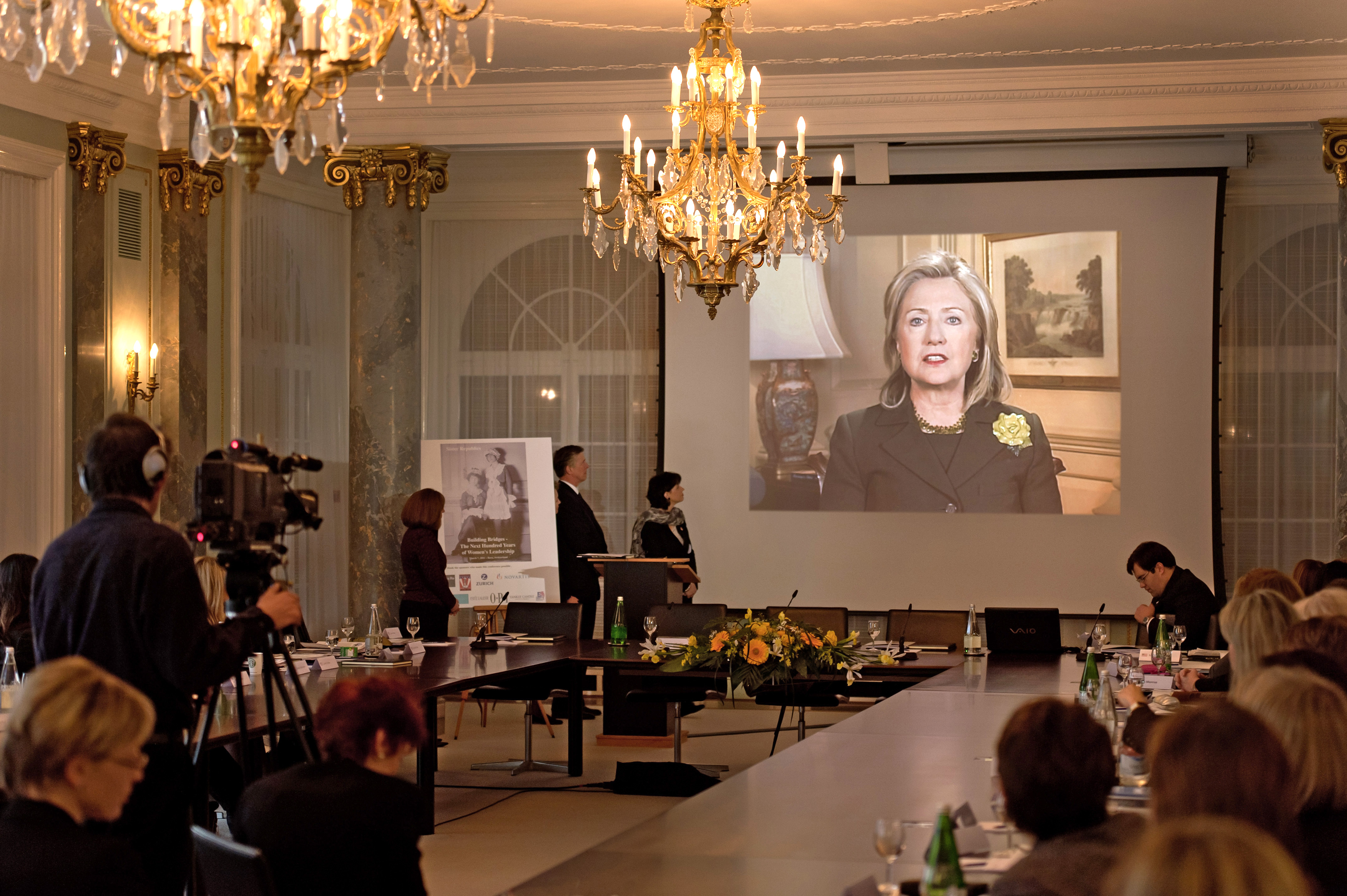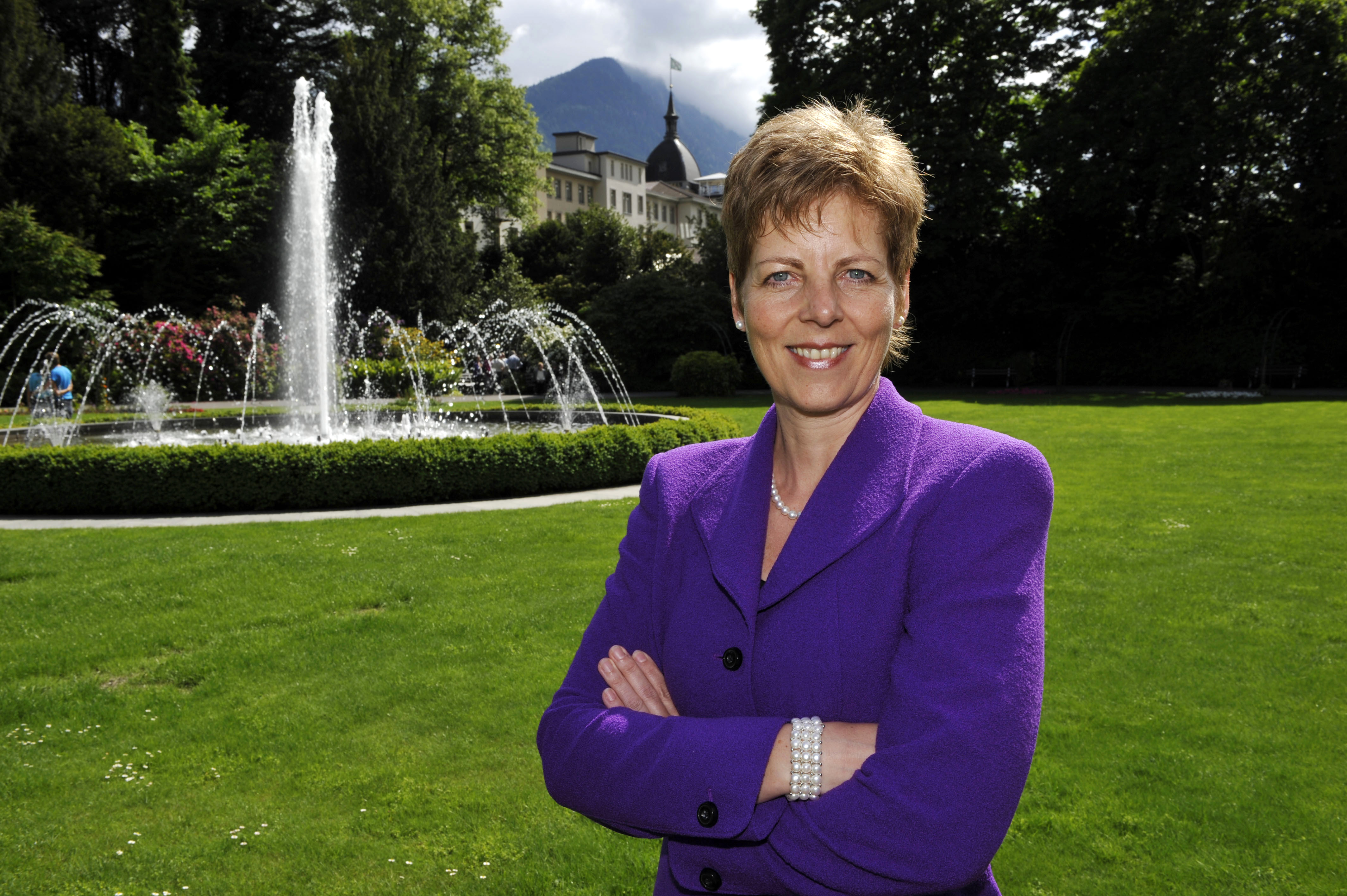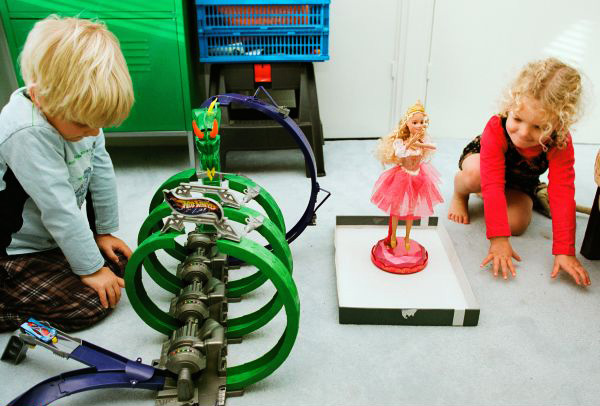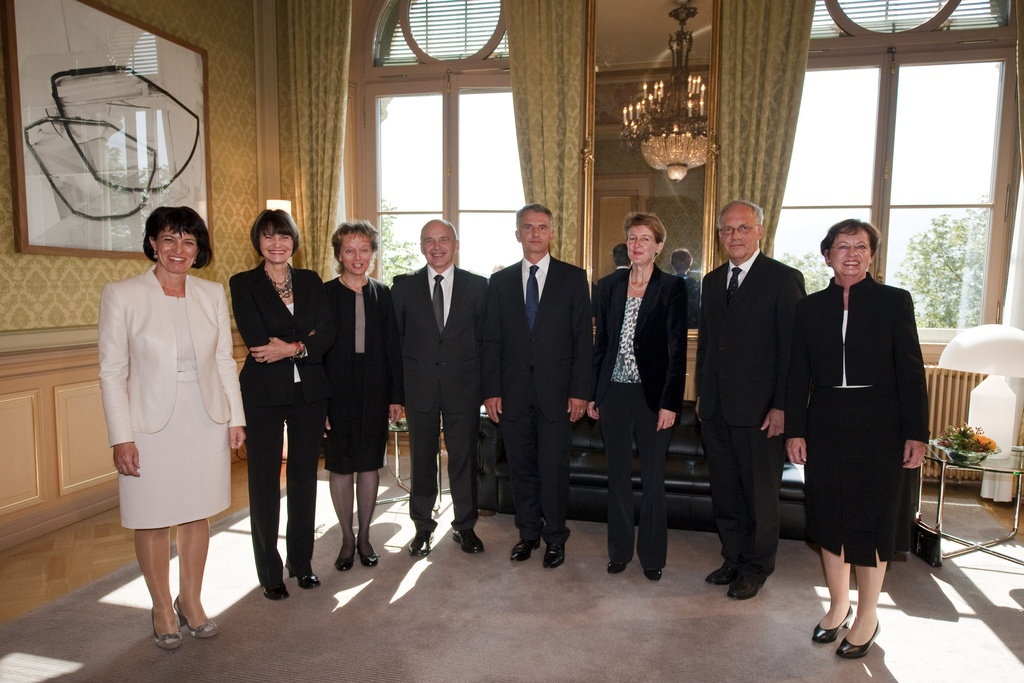Women share secrets to success

A woman with the ear of President Barack Obama, a magazine editor and a company CEO: just some of the elite who met in Bern this week to talk about female leadership.
A uniquely Swiss-American event, Building Bridges: The Next Hundred Years of Women’s Leadership, brought together more than 50 women excelling in the fields of politics, business, science and media.
The conference was the brainchild of Megan Beyer, wife of the United States ambassador to Switzerland. Inspired by last year’s historic female majority in the Swiss cabinet and the 100th anniversary of Women’s Day on Tuesday, she decided to hold a pow-wow between the “sister republics”.
Giving weight to the event was a video message from US Secretary of State Hillary Clinton, who told participants: “Let us use this conference to create the mechanisms, connections and partnerships to help advance the participation and presence of women in both our countries.”
While not seeking an outright result, the conference served more as a think-tank, tapping into the experience and know-how of women in leadership positions.
Success stories and lessons learnt were shared, but not before an appeal by the male representative in the room, Ambassador Donald Beyer.
“I have been privileged to serve as President Barack Obama’s US Ambassador to Switzerland. I am also privileged to have been born a white male American. All my life the structure of society has been set up for my benefit,” he said, to knowing laughs from the room.
Beyer recognised he had gone to the best schools – all male – and served on all-male company boards.
“I say none of this to brag, but to sound a note of tragedy. For I deeply believe that the progress of humanity, the advance of civilisation, can and must be measured by the emancipation and inclusion and leadership of women.”
“Thick layer of men”
Swiss Communications Minister Doris Leuthard was also on hand, noting that since belatedly giving women the vote in 1971, “Switzerland has now joined the ranks of normality”.
“Gender policies alone will not make this world a better place. If we really want to improve the world, we can only do it if men and women work together as partners in team work,” she urged.
One phrase being bandied around the conference seemed to strike a chord with many: a quote attributed to Laura Liswood, a senior advisor at Goldman Sachs, that the glass ceiling stopping women’s progress was actually “a thick layer of men”.
“I think that’s a very good description of what it is,” one of the speakers, Nia Joynson-Romanzina, global head of diversity at Swiss Re, told swissinfo.ch. She started out in the United Nations and often was the only female at meetings.
“That’s when I started realising there really was a lack of women at a certain level.”
She told the conference that companies needed to take concrete steps to change their “DNA” with diversity-inducing policies and systems. Key is getting the commitment of the CEO, something she says happens at Swiss Re.
Leadership styles also need to change, she said. “By changing leadership styles you start addressing the culture in which people are working. We start moving towards a more inclusive culture.”
Job allure
Companies where women have a significant presence are more profitable, according to one presentation given about the World Economic Forum’s Gender Gap Report. Likewise, those countries that have the smallest gap between men and women also have the highest gross domestic product.
“It’s just good for economic growth,” Ambassador Beyer noted.
For Lisa Feldmann, editor-in-chief of Annabelle magazine, the big issue is encouraging women to continue their career after having children.
“We have to find out what makes the situation at home, dealing with Pampers, cooking and talking to a two-year-old infant, so much more interesting than coming to a job that’s high maintenance, where you are involved in a very adult way;” she told swissinfo.ch.
“We have to find out what’s wrong with our job situation, why it’s so focused on certain qualities, qualities maybe women don’t want to deliver.”
Building relationships
So, how will leadership evolve over the next 100 years?
A shift is already underway, according to leadership guru Betsy Myers, a former top advisor to Barack Obama.
One in two workers in America feels undervalued, mainly because of their boss: the old style of leadership – “command and control” – doesn’t work anymore, Myers said.
“The style today is more one of collaboration, listening, that people feel that whatever they are doing is purposeful, that they are cared about. It’s a more feminine style actually,” she told swissinfo.ch.
Her advice for women leaders of the future: take responsibility for your career. “For women it’s having the confidence, voicing what it is you want, where you want to go and then figuring out who the mentors are in the organisation that can help me get there. Because everything we accomplish in life is really due to relationships,” she said.
“This whole conversation about a boy’s club – women can break into that by building relationships with men and women and then being clear about what it is they want.”
Building Bridges: The Next Hundred Years of Women’s Leadership was organised by the US Embassy in Bern at a Swiss government building on March 7.
The one-day event included panel discussions on gender equality, breaking the glass ceiling, closing the wage gap, the balance between work and life, women in development and peacekeeping.
The Global Women’s Institute of George Washington University has expressed interest in doing a research project on the conference findings as well as a feasibility study on taking something that’s working for women in Switzerland and analysing how that could be applied in the US.
A follow-up meeting could take place with the same participants.
The US Ambassador to the Organisation for Economic Co-operation and Development unveiled the OECD Gender Project at the Building Bridges conference in Bern.
The project is based on the idea that advancing women’s economic empowerment is a key to recovery and continued economic prosperity.
The project plans to provide families, businesses, economists and policymakers with comparative knowledge about gender gaps, while also providing policies to lessen disparities.
More concretely, data about gender gaps gathered by the OECD and World Bank will be used to pinpoint economic obstacles women face and successful approaches in different countries. Employer groups will be brought into the dialogue.
At the Ministerial Council meeting in May 2011 the OECD will release a comparative analysis of member country performances and best practices in gender. The OECD Gender Database with concrete lessons will also be made public. The US will encourage OECD member countries to join in on a political call to action.

In compliance with the JTI standards
More: SWI swissinfo.ch certified by the Journalism Trust Initiative






You can find an overview of ongoing debates with our journalists here . Please join us!
If you want to start a conversation about a topic raised in this article or want to report factual errors, email us at english@swissinfo.ch.